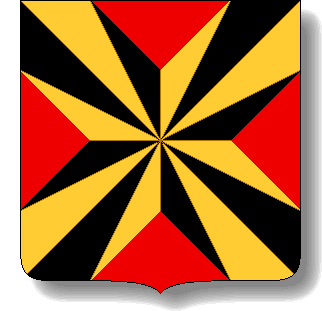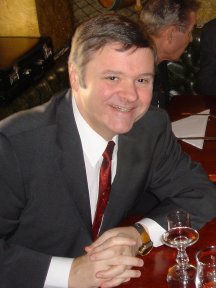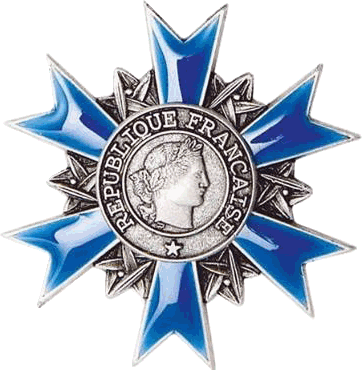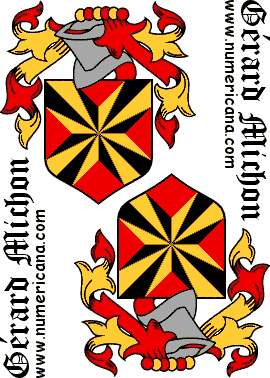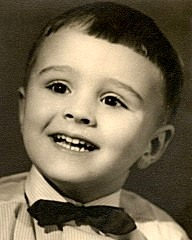
 For centuries, the family of Gérard's father Henry Michon (1907-1968) roamed
the same part of central France as an extended noble family going by the moniker of
Michon de Vougy de Pierreclos du Marais (or parts thereof).
The various branches of that family bore differenced
arms, often blazoned after the pattern:
Azure, something Or between three things Argent.
The genealogical research conducted in the 1990's by
Robert Michon (Gérard's late half-brother)
failed to prove or disprove the existence of a connection between the two families
(Robert didn't believe there was any, in recorded history at least).
For centuries, the family of Gérard's father Henry Michon (1907-1968) roamed
the same part of central France as an extended noble family going by the moniker of
Michon de Vougy de Pierreclos du Marais (or parts thereof).
The various branches of that family bore differenced
arms, often blazoned after the pattern:
Azure, something Or between three things Argent.
The genealogical research conducted in the 1990's by
Robert Michon (Gérard's late half-brother)
failed to prove or disprove the existence of a connection between the two families
(Robert didn't believe there was any, in recorded history at least).
Thus,
Gérard Michon refrained from appropriating the aforementioned
Vougy blazoning pattern, possibly unduly.
On May 3, 2013, he assumed the newly created personnal arms described on this page.
Registration with the Conseil Français d'Héraldique
was granted on December 7, 2013 under number 2013 / 892
(later published as 2016 / 895).
Gules and Or tinctures are the heraldic colors of the town (Caen)
and region (Normandy) where Michon grew up.
They're also the colors of his Alma Matter
(Polytechnique) whose traditional nickname ("X")
is meant to be represented by the prominent saltire.
The gironny blazonment evokes his birthplace (Gironde).
Using Azure instead of Sable as third tincture
would have reinforced the heraldic connection with Gironde and would have established one with UCLA
(whose colors are Or and Azure). However, the rules of classic heraldry
prescribe that Gules and Azure shouldn't touch (besides, it simply looks ugly).
Gérard Philippe François Robert Michon was born in
Talence
(Gironde)
on March 29, 1956.
He's been living in Los Angeles since August 16, 1980.
At age 17, he earned top honors among all the graduating high-school students of the
Académie de Caen
with a combined score of 287 / 320
(for an average of 17.94 out of 20) earning
rare full marks
(20/20) in both mathematics and physics,
in part for having spotted a misconception in one of the questions in the written exam.
He scored "only" 16/20 in philosophy.
However, a poor oral performance in German
made his score just one point short of the magic threshold of 18/20 which would
have earned the rare félicitations du jury distinction
(which nobody earned in the district that year).
In his senior year, Michon was ranked third in the Nation when he represented his high-school
(Lycée Malherbe, Caen) in the 6-hour
philosophy competition of the
Concours Général des Lycées et Collèges
(he also competed in mathematics but didn't perform up to expectations).
After graduating from high-school, Michon moved to the secluded top floor of the same building, home of
the Taupe Laplace, to prepare for
the entrance exams of the major French scientific Grandes Ecoles.
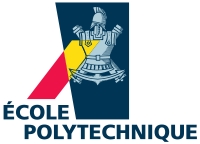
|
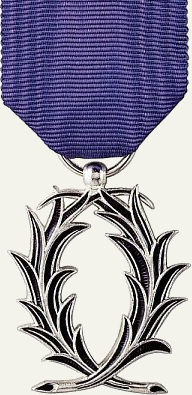
|
On July 24, 1976, Gérard Michon was
admitted
into the most prestigious engineering school in France,
the Ecole Polytechnique
(he ranked 23rd in the national entrance competition).
After a year of military service, he started the Polytechnique curriculum in the Fall of 1977.
In Mathematics, the legendary Laurent Schwartz (1915-2002)
was lecturing on functional analysis.
Jean-Louis Basdevant was giving introductory lectures on Quantum
Mechanics with the help of about a dozen faculty members who were coaching students in small groups
(Michon's coach was Serge Haroche (1944-) who went on to
earn the 2012 Nobel prize for physics).
Michon graduated from Polytechnique in 1979, having completed a thesis in
Computer Science under the guidance of
Jean-Marc Steyaert
(X1968) at Polytechnique,
Philippe Flajolet (1948-2011; X1968)
at INRIA and
Jean Vuillemin (X1966)
professor at Paris-Sud XI (Orsay) himself formerly a doctoral student of
Donald Knuth (1938-) at
Stanford.
That work was also hosted
at Jussieu
in the advanced troisième cycle program directed by
the normalien
Maurice Nivat (1937-2017)
who was simultaneously professor of Computer Science at Polytechnique.
Such ad hoc bridges between Polytechnique and Parisian universities
were growing in popularity at the time. For obscure reasons,
the Polytechnique administrators decided to put an abrupt end to them.
Nivat made the decision of
passer outre
by convening an examining committee in 1979 for the two Polytechniciens
under his direct care (Michon and
Jean-Louis Legrand)
pledging to award them a
DEA degree
(the prerequisite for a doctorate, at the time) on the 1980 rolls of
Paris VII, as soon as both students got out of Polytechnique.
That probably happened.
Subsequently, Michon obtained two specialized master-level degrees the same year (1981).
At the time, Polytechniciens were required by law to obtain at least one of these
or face a severe fine corresponding to the actual cost of their education at
Polytechnique (which they otherwise received for free, while being paid
as junior military officers).
One of those degrees was from
the School of Engineering and Applied Science at UCLA
(University of California at Los Angeles) and the other from the
Ecole Nationale Supérieure des Télécommunications
(ENST of Paris, before it was dubbed
Télécom ParisTech).
Michon had taken advantage of an exchange program that made it possible to graduate from both institutions
by replacing the final year at ENST with the completion of an MS program at UCLA.
To that end, Michon had obtained hefty scholarship funding from the French
Ministère de l'Industrie, for 1980-1981.
Matriculating as Gerard Philippe Michon,
he completed the UCLA requirements for the MS degree in a single year and went on to obtain a
doctorate
in 1983, successively under
Sheila A. Greibach (1939-)
of GNF fame, and
Judea Pearl
(1936-)
father of the slain journalist Daniel Pearl (1963-2002)
and sole recipient of the Turing Award for 2011
(the highest honor in Computer Science).
Some of the
doctoral dissertation is available
here. It's tersely indexed by
Google Books
but a full scanned copy
(technical report 840029) is available online from the archives
of Pearl's Cognitive Systems Laboratory.
Crude "typesetting" on daisywheel printers was standard in Academia, back then
(just before the introduction of
desktop publishing).
The most relevant paper on the topic was published by Judea Pearl in July 1983:
On the nature of pathology in game searching.
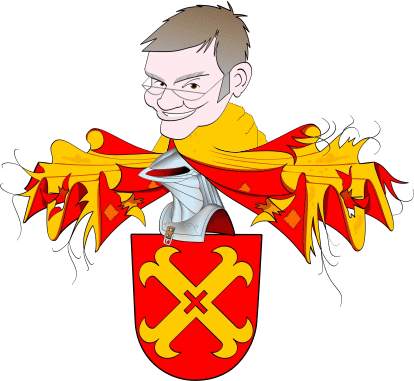


On March 19, 2000, the first page of Numericana.com
went online as the future home of hundreds (now thousands)
of educational scientific snippets by Dr. Michon.


 In April 2003, an heraldic component appeared within
Numericana, starting with tiny representations (45 by 48 pixels)
of the arms of Galileo and
Descartes.
Thereafter, whenever possible,
the Numericana discussions of the results of major scientists
were accompanied by freshly minted thumbnails of their arms...
In April 2003, an heraldic component appeared within
Numericana, starting with tiny representations (45 by 48 pixels)
of the arms of Galileo and
Descartes.
Thereafter, whenever possible,
the Numericana discussions of the results of major scientists
were accompanied by freshly minted thumbnails of their arms...
 Those quaint little shields were formally collected in a single
armorial of scientists
which grew fairly rapidly. Thanks to Colonel
Guy H. Power
(of NASA) this would soon attract the attention of
Dr. Clemens Jochen Wilke,
a trained German chemist working as a European patent attorney.
Wilke is also an heraldic artist who has been donating some of his artwork
to lavishly illustrate
quite a few entries in Numericana's armorial.
The armorial is known far and wide as
Escutcheons of Science (EoS).
Those quaint little shields were formally collected in a single
armorial of scientists
which grew fairly rapidly. Thanks to Colonel
Guy H. Power
(of NASA) this would soon attract the attention of
Dr. Clemens Jochen Wilke,
a trained German chemist working as a European patent attorney.
Wilke is also an heraldic artist who has been donating some of his artwork
to lavishly illustrate
quite a few entries in Numericana's armorial.
The armorial is known far and wide as
Escutcheons of Science (EoS).
The 10-th anniversary of Numericana (March 19, 2010)
happened to coincide with Wilke's 50-th Birthday. For the occasion,
he created the humorous heraldic composition shown above right,
based on his earlier creative rendition of
Gutenberg's coat-of-arms
(including the dramatic drags, inspired
by the beggar on Gutenberg's shield).
The saltire moltine
(akin to the Azure charge in the de Broglie shield)
simply stands for the roman numeral
"X" of Numericana's tenth year.
Wilke's caricature of Michon was used as a crest for the occasion.
(Wilke and Michon have corresponded extensively but they've never met or even talked.)


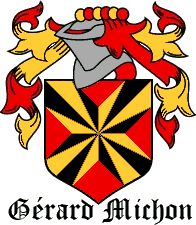
Gérard P. Michon
is not directly related to the following contemporary individuals:
-
Gérard Michon, mathematician (topologist)
at Université de Bourgogne :
1989 |
1994.
-
Gérard Michon, French engineer
(sales & marketing director at Thales).
-
Gerard Michon, Sales Engineer
at Dell.
-
Gérard Michon, artisan
bureautique in Sommedieue (Meuse) depuis 2012.
-
Gérard Michon, huissier
in Bagnolet, France.
Also (?) in real
estate (on the board of 3 companies, including GEGELU). Born in 1947.
-
Gérard Michon, late founder of a
printing company in Neuilly-sur-Marne, France.
-
Gérard Michon, (born 1953-05-11).
Electronics.
-
Gérard Michon, (born 1961-06-11). Head of
Michon Maçonnerie
Terrassement (est. 1989).
-
Gérard Michon, Self-employed
naval repair technician in Quiberon, since 2009.
-
Gérard Michon
(1950-2015).
Husband of Eliane, father of Pascal and David, brother of Christian and Jean-Louis.
-
Gérard Michon, born
1948-12-14, retired from the aeronautical and automotive industries, living in Perthuis (France).
-
Gérard Michon (1944-01-15)
Moissy-Cramayel.
Possibly the man buried on 2016-10-16)
aged 72, in Vézeronce-Curtin (38510) Isère.
-
Gérard Michon:
Boy alto soloist of Les petits chanteurs à la croix de bois
(1950).
-
Gérard Michon:
(c.1938-Sept. 2017 á. Mâcon).
-
Gérard Michon (1931-2006).
Son of Adelphe Michon & Suzanne Deconbe.
-
Gérard Michon
(1936-2021)
Husband of Marguerite Michon. Sa fille Myriam Michon. , Sa fille et son gendre Christine et Tony Desbrosses.
-
Gerard Michon, Dutch gag writer for the Sjors van de Rebellenclub,
illustrated by Carol Voges (1925-2001)
in the weekly comic magazine Sjors, from 1954 to 1963.
Trivia :
According to Namespedia,
approximately 28 people are called "Gerard Michon"
(there are at least two in the US
and 21 in France).
About 8 of those are on LinkedIn.
The surname "Michon" is borne by approximately 4200 people in at least 21 countries
(2400 in France, 800 in the US).
Roughly 600 women bear the first name "Michon"
(almost exclusively in the United States).
It seems that only one of them is called "Michon Michon".


